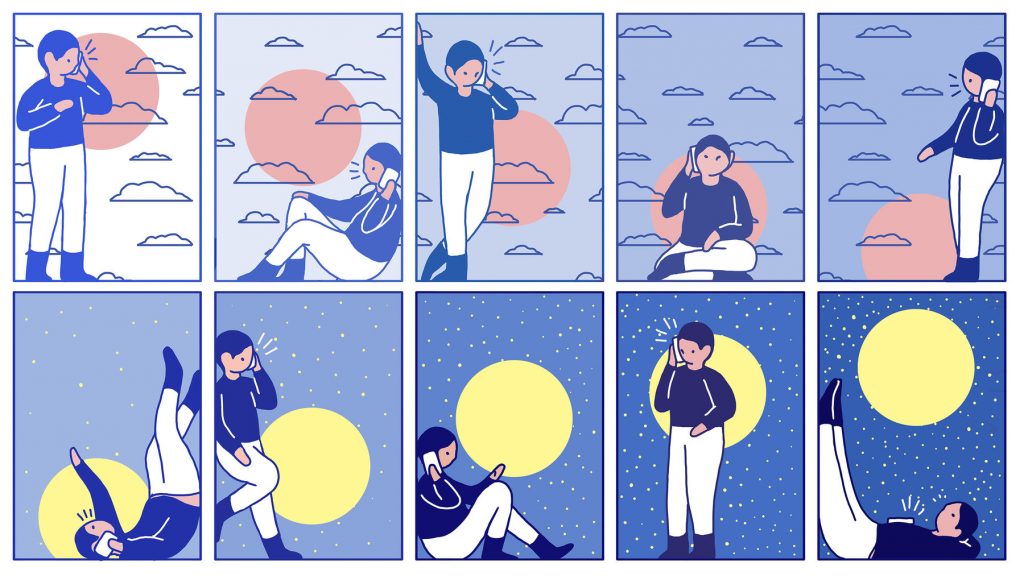
Find out what’s been going on in our sessions as one of our Lead Readers shares news from their group.
Reading Stories and Poems over the Phone with the Dower House group
Sue McDermott is a lead reader who helps to run our shared reading group at Dower House in Costorphine, and at the Royal Botanic Gardens Edinburgh. Carole McMurray helps to run our shared reading group at the National Library of Scotland.
‘It’s the connecting that’s important’ – Claire (one of Open Book’s Co-Founders)
Looking back to March and the beginning of lockdown, we, as Open Book Lead Readers, were keen to keep in touch in some way with everyone in our groups now that sitting together sharing stories and poems was no longer possible. Those with internet access could receive the weekly tonic that is ‘Unbound’, our newsletter packed with stories, poems and opportunities to link into other literature projects. They could choose to share stories and poems or decide to keep writing by entering the virtual Zoom world alongside others. Still, there were three group members who don’t have computers and two of them were registered blind, so text sharing was going to be tricky. Carole McMurray, another volunteer Lead Reader and I, had been telephoning these three people to keep in touch. With encouragement from staff at Open Book and also with the keen go-ahead from the group members themselves, we set about giving them the opportunity to have stories and poems read over the phone.
What to read? My two callers did not have prior access to the text. I tended to pick something from the cornucopia of ‘Unbound’ or poetry I already had at home that I loved or felt they might have heard of. On getting to know them it was soon quite evident what kind of texts they enjoyed. They began to favour certain authors and poets and they looked forward to hearing their work. One felt a real connection with the poetry of Edwin Morgan and Philip Levine, whilst for another Jan Carson’s ‘Ice Cream Man’ and ‘Chocolate’ created chuckles over the phone! Carole’s caller absolutely loves the opportunity to chat but chose not to have stories or poems read. Carole tells me that they sometimes talk about books, often about family and how she’s coping during lockdown. My two callers are such wonderful people and have embraced this challenge with me. As the phone calls have progressed, a relationship and friendship has developed. It has been a real honour and pleasure sharing their memories; being evacuated during WW2, watching the VE celebrations in Princes Street are a couple of examples. I’ve been privileged to hear one caller’s own poems sometimes written with great humour. There have been a few moments of shared sadness but mostly there have been times of reflection, reminiscences, joy and laughter.
Other organisations have tried similar approaches to reading over the telephone and Carole and I are as one in saying that if you think you know someone who might appreciate this kind of connection at this uncertain time, please give it a go. At the end of the call you will both feel better for it and you will find it quickly becomes an integral part of your lives and a bit of uplift under the shadow of Covid 19. Here are a few tips and thoughts from our experience so far:
- Start by just chatting in the early calls. If you think that someone might be interested why not trial it for a couple of weeks for ten minutes or so. Find out what they might enjoy hearing.
- It may be self-evident but listening is very important. Make sure you can both be heard (one of my callers has a hearing aid).
- Find a comfortable undisturbed space to phone.
- Set a regular time every week if you can and you’ll hear as I do that they anticipate the call, ‘Oh, hello Sue. Nice to hear from you again.’ Carole’s caller says it gives her structure to her week and she looks forward to their chats.
- Set a flexible time limit, say 30-40 mins.
- Keep things simple especially to start with, a short story or poem. Jan Carson’s postcard stories have been perfect.
- If the phone goes quiet, that’s fine. They may need ‘thinking time’ just like in face to face meetings. You could signal to take time and that you are still there.
- Have a confidential ‘fall back’ or support person to share any issues that might arise. It’s possible that your caller might feel a little low at times and it’s good to have someone to share this with.
- Share your personal responses, something that stands out for you, a memory the text evoked or what made you smile.
- Have fun!
‘All kinds of people need these kinds of connections especially the golden oldies’ – one of my callers said when I asked his opinion about the phone calls.
I have been moved by the trust put in me and feel it is a very special and privileged experience. I’ve received lovely comments for example,’ thank you for listening to me’, ‘thank you for the poem’ and ‘good that we can keep it going and keep the reading active’. It is really quite straightforward to set up and very rewarding. It is such a simple thing that can mean so much.




